
How to look for records of... Foreign Office correspondence 1891-1905
How can I view the records covered in this guide?
How many are online?
- None
1. Why use this guide?
Use this guide for advice on how to search for Foreign Office correspondence dating from 1891 to 1905 and now held at The National Archives. You will need to visit us to carry out a search and to view the documents. For advice on other types of Foreign Office records see our broader overview guide.
Foreign Office correspondence is a rich source of information on the history of British relations with foreign states and can also provide insights into past domestic issues in foreign countries.
There are tens of thousands of records of general correspondence at The National Archives, ranging from letters, both personal and official, telegrams and despatches, to reports, notes and memos and anything else that was sent from one place or person to another in the business of the Foreign Office.
2. The essential search tools: Foreign Office indexes and registers
To identify the Foreign Office correspondence from 1891 to 1905 relevant to a particular country, person or subject area, you will need to use the Foreign Office indexes which make up series FO 804 (you can also search in FO 738 which contains photographic copies of the volumes held in FO 804) and the registers in series FO 566.
These indexes and registers were created and used by the staff of the Foreign Office itself – not all the correspondence to which they refer was sent for preservation to The National Archives so today some index and register entries refer to documents which no longer exist.
Neither the indexes, registers or correspondence have been digitised and therefore cannot be viewed online. To view them you will need to visit The National Archives, or pay for research.
3. Using the indexes and registers to find correspondence
Follow the steps below to work your way from the indexes to the registers and finally to the paper correspondence itself. None of the indexes, registers or correspondence are available to view online or on microfilm so you will need a readers ticket to order and view them in person at our building in Kew. Our page on researching at The National Archives explains more.
Step 1: Identify and order the relevant index in FO 804
Use the FO 804 (or FO 738) series search in our catalogue to search by country name, as shown below:
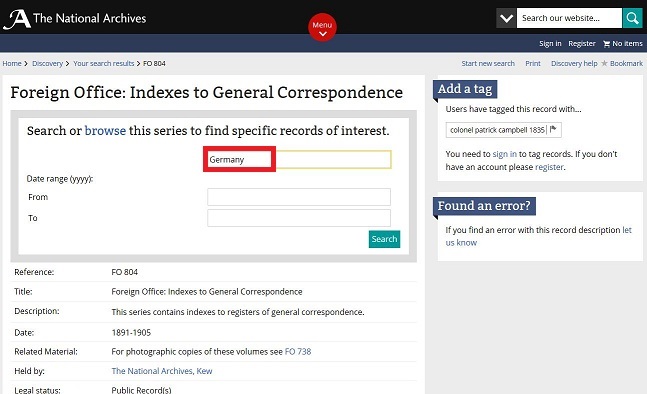
A search for the Germany index in the FO 804 series search
From the results of your search, select the appropriate reference, like the one shown below, so you can order the index for viewing in our Document Reading Room.
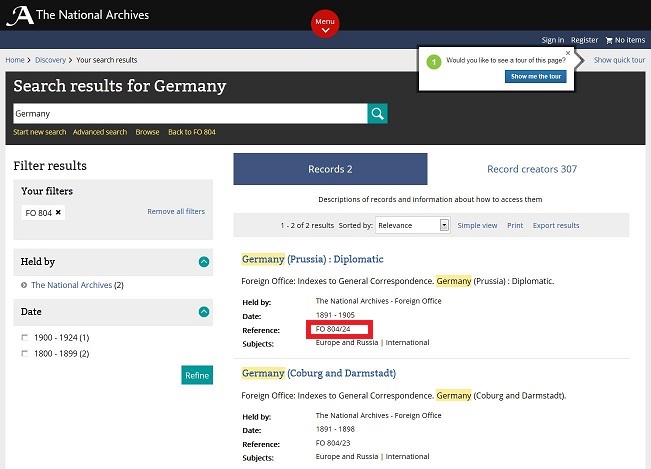
Catalogue search results page showing the results of a search for Germany in FO 804
Step 2: Identify the relevant entry in the index
The indexes are arranged alphabetically, with each page divided into two columns: ‘subjects’ and ‘persons’.
The index will provide you with the year and the page number of the register you need to look at, as shown below.
You may have to do some lateral thinking to find your way around the subject index terms used.
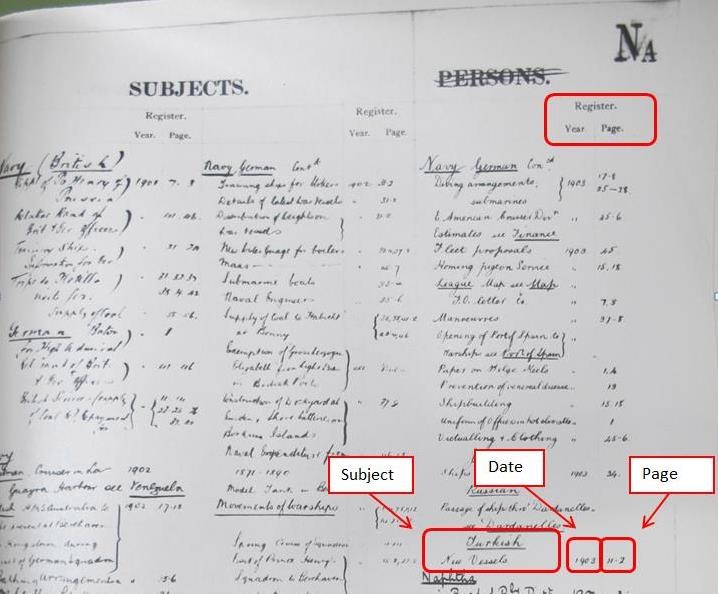
Page from a Foreign Office index
Step 3: Identify the relevant register
Use the FO 566 series search in our catalogue to search by country name and year.
The registers are often split into separate volumes (Diplomatic, Consular, Commercial and Treaty) and this will be evident in search results. The Diplomatic registers are those most commonly used, but, depending on your subject, it may be worth ordering the others as well. The reference for the Diplomatic register for Germany is shown below:

Cut-away of a catalogue search results page showing the reference for the Diplomatic register for Germany
With a reference you can order the relevant register for viewing in our Document Reading Room.
Step 4: Identify the relevant entry in the register
Go to the relevant year and page in the register (the page number appears in the top corner, above the line), and identify the subject you are looking for.
The register will provide you with:
- author
- despatch number
- subject
Entries in red ink are for telegrams.
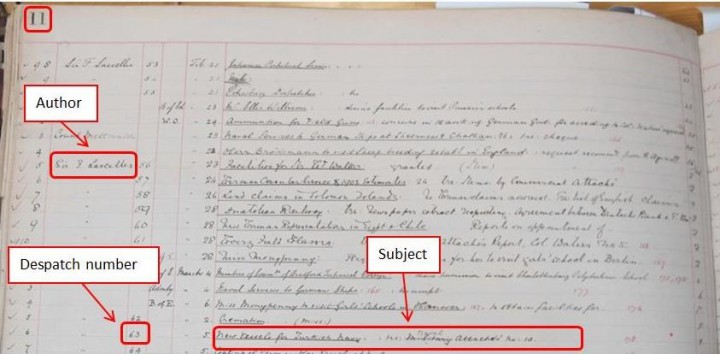
Page from a Foreign Office register
Step 5: Find the relevant despatch
You will first need to identify the original correspondence series for your country. To do so, you can:
- use the list of correspondence series by country in our catalogue
- ask for the list at the enquiries desk in the Open Reading Room
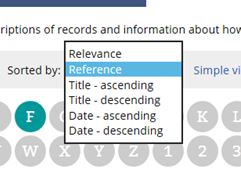
The drop down list on catalogue search results pages that allows you to sort results by reference
Use the advanced search in our catalogue, leaving the keyword box blank and restrict to the relevant country series and year.
Using the drop down menu (shown on the left), sort your results by reference.
Then look for the volume which contains despatches from the author you have identified, and look for the range that contains your despatch number (like the registers, the correspondence can be split into Diplomatic, Consular, Commercial and Treaty).

Cut-away from a search results page in the online catalogue showing the document reference for the 1903 volume of correspondence that includes Despatch 63
You can then order the relevant volume and look for the despatch within it.
4. Further reading
Some of the publications below may be available to buy from The National Archives’ bookshop. Alternatively, search The National Archives’ library catalogue to see what is available to consult at Kew.
James Cronan and Keith Mitchell (eds.), Foreign Office Records, 1782 to 1986, An index to country series (Lists and Index Society, 2017)
Michael Roper, The records of the Foreign Office, 1782-1968 (Public Record Office Publications, 2002)
L Atherton, ‘Never complain, never explain’, Records of the Foreign Office and State Paper Office 1500-c1960, Public Record Office Readers’ Guide No7 (PRO publications, 1994)
The records of the Foreign Office, 1782-1939, Public Record Office Handbooks No13 (HMSO, 1969)